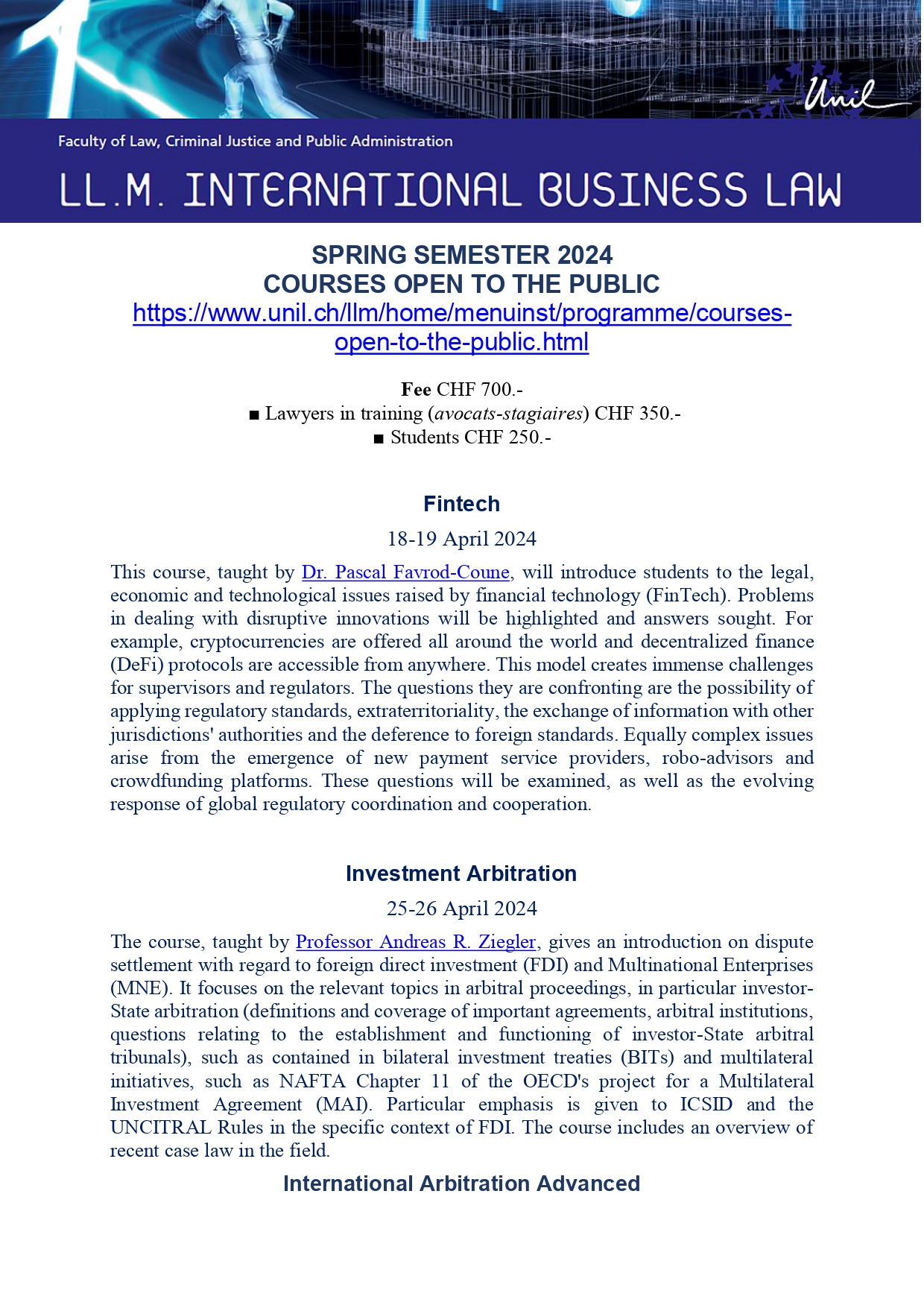OPEN COURSES SPRING 2024
Fintech
18-19 April 2024
This course, taught by Dr. Pascal Favrod-Coune, will introduce students to the legal, economic and technological issues raised by financial technology (FinTech).Problems in dealing with disruptive innovations will be highlighted and answers sought. For example, cryptocurrencies are offered all around the world and decentralized finance (DeFi) protocols are accessible from anywhere. This model creates immense challenges for supervisors and regulators. The questions they are confronting are the possibility of applying regulatory standards, extraterritoriality, the exchange of information with other jurisdictions' authorities and the deference to foreign standards. Equally complex issues arise from the emergence of new payment service providers, robo-advisors and crowdfunding platforms. These questions will be examined, as well as the evolving response of global regulatory coordination and cooperation.
Register now
***
Investment Arbitration
25-26 April 2024
The course, taught by Professor Andreas R. Ziegler, gives an introduction on dispute settlement with regard to foreign direct investment (FDI) and Multinational Enterprises (MNE). It focuses on the relevant topics in arbitral proceedings, in particular investor-State arbitration (definitions and coverage of important agreements, arbitral institutions, questions relating to the establishment and functioning of investor-State arbitral tribunals), such as contained in bilateral investment treaties (BITs) and multilateral initiatives, such as NAFTA Chapter 11 of the OECD's project for a Multilateral Investment Agreement (MAI). Particular emphasis is given to ICSID and the UNCITRAL Rules in the specific context of FDI. The course includes an overview of recent case law in the field.
Register now
***
International Arbitration Advanced
16-17 May 2024
Addressed to professionals with sound knowledge of this area and students who have already completed the LL.M. courses in International Commercial Arbitration or Investment Arbitration, this course, which is organised by Professor Andrea Bonomi and relies on contributions by experienced counsels and arbitrators, tackles specialised problems arising in the practice of international arbitration. In order to propose a wide range of themes, topics will change each year and may include: the extension of arbitration agreements to non-signatories, parallel proceedings, interim measures, applicable law and overriding mandatory provisions, the taking of evidence, confidentiality and privileges, third party-funding, and/or issues raised in international arbitration in specific jurisdictions.
Register now
***
Energy Arbitration
23-24 May 2024
This course, taught by Dr. Edouard Fromageau, studies the use of international arbitration in the energy sector, and how disputes arising in this context are resolved. From the investment perspective, foreign investors require strong guarantees that states will respect the “rules of the game” that constitute the basis of their investments. On the other hand, states can use their sovereign powers to regulate and protect public interests and interfere with foreign energy investments, which are of socio-economic importance. This course aims to review and understand the overall framework of international energy investments, including investment treaties and dispute resolution mechanisms.
Register now
***
Technology and Dispute Resolution
6-7 June 2024
This course looks at both technology used in the process of dispute resolution and disputes involving new technologies. This includes the topics of Legaltech, AI and predictive justice but also the use of digitalisation to simplify hearings and witness examinations in court and arbitration proceedings. Furthermore, students will analyse decisions in disputes involving new technologies (eg. smart contracts, digital assets). The course, organised by Professor Eva Lein, offers face-to-face teaching, including sessions with international experts, and workshops in which the students will discuss case scenarios.
Register now






